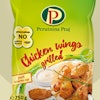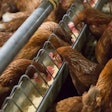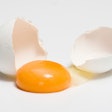
Marketing studies in Mexico, one of the countries with the largest Catholic population on the planet, show that the consumption of fish and shellfish grows up to 15 percent during Lent and Holy Week, the most important ritual commemoration of Catholicism that evokes the last days and the resurrection of Jesus Christ.
Within a few percentage points, more or less, a similar trend is experienced in the rest of Latin America, where the tradition of switching from red meat to white meat on some special sacred dates remains strong. According to this precept, one could choose chicken meat, even eggs, but Catholics overwhelmingly opt for fish and seafood.
Although the origin of this dogma on the Catholic ritual diet is not very clear, it is said that the abstention of red meat entails the symbolism of moving away from the worldly pleasure or from the pleasures of the flesh. White meat is perceived as a food of volatile origin, typical of the ethereal world of air and water.
Also, let us remember that in the early years of Christianity, the Greek word "icthus" (fish) and the sign of two crossed arches forming a kind of fish, served to identify the devotees and their communities. Icthus, in that conspiratorial reality, was the acronym formed by the initials of the Greek phrase "Jesus Christ, Son of God, Savior."
The tradition of switching from red meat to white meat, with preference to fish and shellfish, can be traced back to the fifth century AD, and some theorists maintain that it is due to the former belief that aquatic creatures reproduced asexually. Poultry, on the other hand, they knew of their "lascivious mood" – to put it somehow – which surely would have determined the ritual preference of some white meats over others.
In these times when commercial poultry farming produces hundreds of millions of tons of quality food through eggs of virgin chickens and celibate broilers, that distant gastronomic prevention that no one knows or remembers, seems today more than ever an anachronistic charade.
Chicken and eggs are healthy and much more economical foods, that for objective reasons and others not so much, may well accompany a little more the diet of more than 1,100 million Catholics in these holy days. Why not?



















